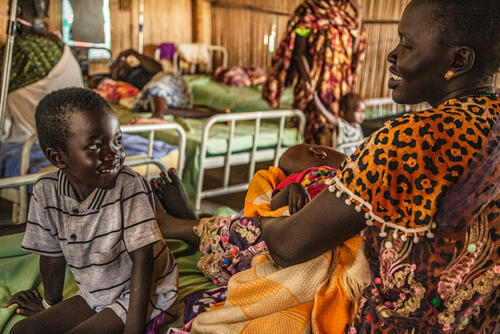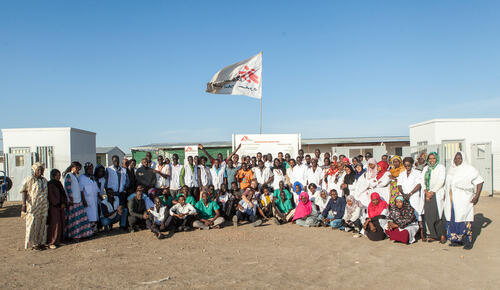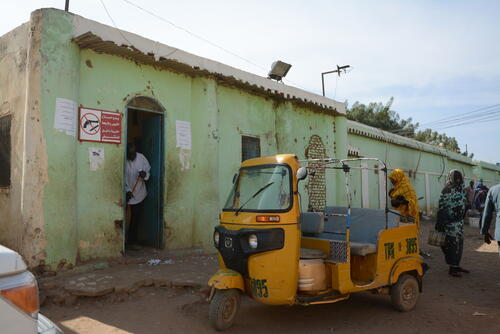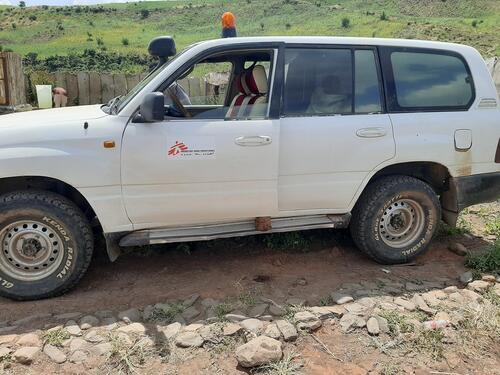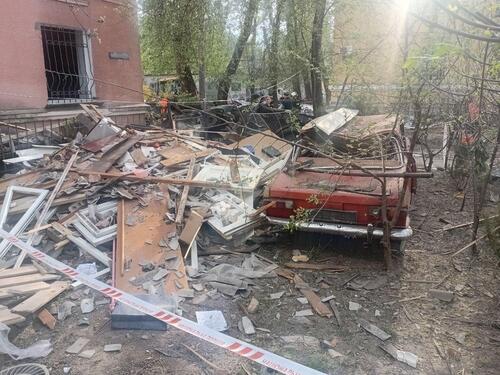Since 2013, Sudan’s White Nile state has hosted tens of thousands of refugees fleeing conflict in South Sudan’s Upper Nile state. For the past seven years, our teams have provided refugees and local communities with medical care. This month we handed over medical activities in White Nile state, including Al-Kashafa hospital, to the Sudanese Ministry of Health.
Soon after some 30,000 South Sudanese refugees arrived in White Nile state in 2013, we launched an emergency response, providing general healthcare and clean drinking water for refugees and constructing latrines in the camp known as Kilo 10.
As more people fled across the border from South Sudan, more camps were established in the region. Our teams expanded assistance to the refugee and host communities by running clinics that provided general healthcare and vaccinating tens of thousands of children against measles and other diseases. Our teams ran health promotion activities while our engineers provided clean drinking water and constructed latrines.

In 2016, MSF and the Ministry of Health upgraded a health facility in Al-Kashafa camp to become a hospital, and in 2019 we opened a newly constructed 100-bed hospital in the camp. Its services include general and specialist healthcare, malnutrition treatment, maternity care and treatment for people with chronic infectious diseases such as HIV and tuberculosis (TB). Today patients come to the hospital from the surrounding villages and nine camps for South Sudanese refugees in the area.
“People stay in their homes, they can’t make money,” says Zakina Adam Ali, MSF nutritional supervisor. “As a result, children get a lot of diseases. This means that our inpatient therapeutic feeding centre is full of children.
“We receive 45 to 50 each week, and as many as 150 children each month. It can make things difficult. I’m unhappy when a baby suffers a lot, but I’m very happy when a baby who is brought to me gets better and returns home in a good physical condition,” says Ali.
Previously, the local community had little access to medical care. MSF’s Al-Kashafa hospital has become the main referral hospital for the refugee and host communities living in the Al-Salam and Al-Jebelin localities in White Nile state.
Currently the hospital serves the majority of the approximately 270,000 South Sudanese refugees living in White Nile State according to UNHCR and around 450,000 people from the local communities, who account for nearly half of the consultations. Most of them are from the El-Salam locality, which is close to the hospital.
“My children Daoud, Al Hadi and Hammouda were born before MSF’s hospital opened,” says Zahra, who is from a village nearby. “I’m pregnant again and my future son, who we’re going to name Ahmed, will be born here in the hospital,” she says.
“We suffered before, without the hospital, but now we can get continuous care, from day one of the pregnancy until the baby is born. The medics monitor your condition very carefully. They do regular check-ups and, if you have a blood deficiency, they give medicine to counter it,” says Zahra
We suffered before, without the MSF hospital, but now we can get continuous care, from day one of the pregnancy until the baby is born.Zahra, MSF patient.
Over the past seven years, our teams has provided nearly 500,000 outpatient consultations and admitted more than 20,000 people to the hospital for treatment. More than 8,000 malnourished children under five have received treatment in the hospital’s therapeutic feeding centre and nearly 5,000 women have given birth in the maternity unit.
We have vaccinated more than 25,000 children to protect them against common childhood diseases. Our mental health team have provided more than 6,000 mental health consultations and health promoters have held more than 10,000 health promotion sessions.
“The major success in Al-Kashafa has been the construction of the new hospital, which led to improved inpatient and outpatient care,” says MSF project coordinator Kennedy Olela, who first worked for MSF in Al-Kashafa in 2016-2017.
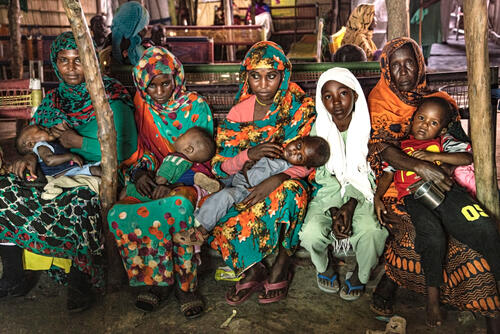
“Back in 2016 and 2017, we started to receive more and more patients and space and services became increasingly stretched,” says Olela. “I came back this year and was proud to see the changes in the provision of medical care in the hospital with its high hygiene standards,” he says.
“We are able to provide quality of care to patients without worrying about weather conditions, which can impact infection prevention and control. The standard of care has improved significantly, and more patients are able to access comfortable care in a very good environment,” says Olela.
This month, we are handing over medical activities in White Nile state, including Al-Kashafa hospital, to the Sudanese Ministry of Health. “We have been able to save many lives and provide medical assistance for both refugees and host communities,” says Claudia Stephan, MSF head of mission in Sudan.
“We have reduced the burden of disease and improved people’s access to quality medical care in White Nile state. It has been a joint achievement, working hand in hand with the Ministry of Health, the Commission of Refugees, the Humanitarian Affairs Commission and other partners towards a common goal to respond to medical and humanitarian emergencies,” she says.
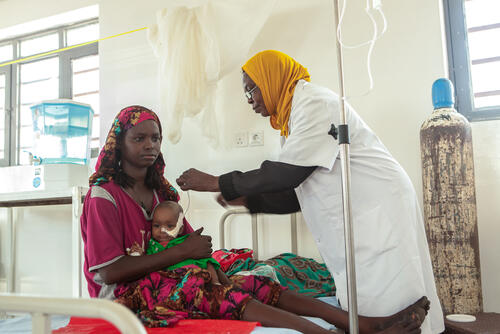
Even though we are ending our medical support in the area, services will continue thanks to the Sudanese health authorities and other national and international partners.
“Our teams remain committed to continue providing essential lifesaving assistance to the Sudanese people,” says Stephan. “We continuously adapt to address the most acute humanitarian and health needs in an impartial manner and in the best possible way. We are confident that our partners will ensure the continuity of this successful project and allocate the necessary resources and healthcare staff.”
MSF has worked in Sudan since 1978 and today runs projects in Khartoum, Gedaref, Blue Nile, East Darfur, Central Darfur, West Darfur, South Darfur and Kassala, with emergency teams launching responses in other areas when needed.



